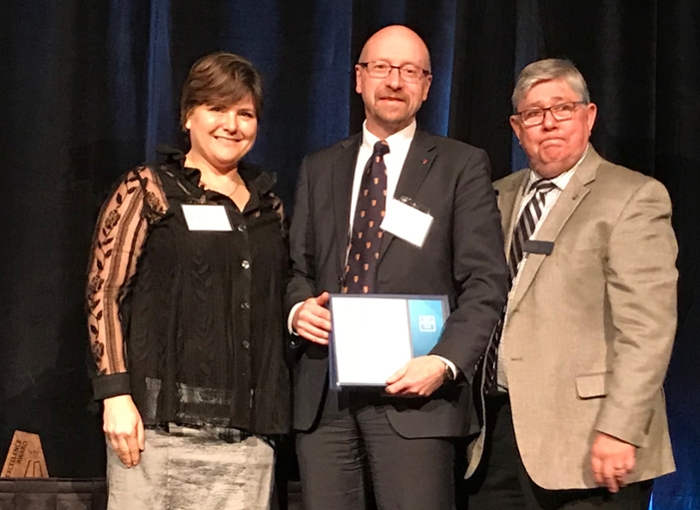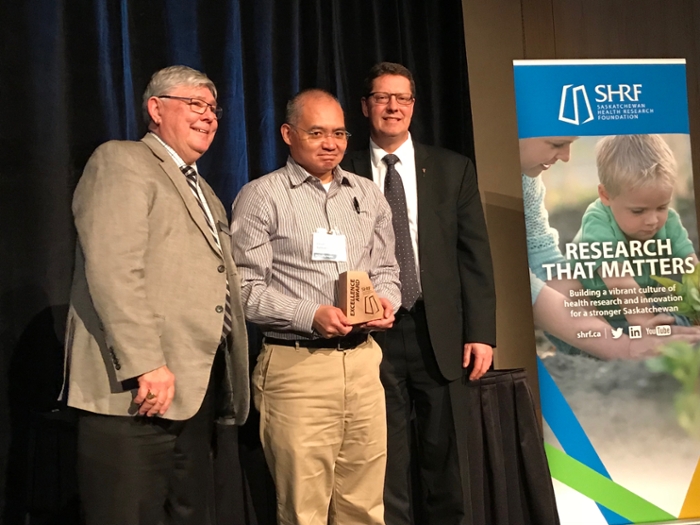
Big night for CoM researchers at SHRF awards
The 14th annual Saskatchewan Health Research Foundation Santé Awards celebration honoured three College of Medicine researchers, and served to highlight the impact of health research in Saskatchewan.
By Marg Sheridan
With research awards including recognition of work being done at other institutions including the University of Regina, Western College or Veterinary Medicine and VIDO-Intervac, the night put a spotlight on collaboration, innovation and the passion of health researchers across the province.
And it was a big night for the CoM, with three faculty members earning honours.
Dr. Lloyd Balbuena (Psychiatry) won the 2017-18 Top Establishment Grant in Socio-Health research for his study, ‘Neuroticism and Mood Instability as Suicide Prevention Targets,’ and Dr. Jim Xian (Oncology) was awarded the Top Collaborative Innovation Development Grant in biomedical research for his work on irreversible electroporation (IRE) as a therapy for pancreatic cancer.
Another big honour for a CoM recipients: The Impact award.
The award, which looks at measurable ROI’s on previously awarded grants, is one of the highlights of the program because it demonstrates the real-life impact Saskatchewan medical research has on health outcomes in the province – and beyond.
And this year it was awarded to Dr. Cory Neudorf (Community Health and Epidemiology) in recognition of the impact of his 2012-13 socio-health establishment grant.
“My research project at the time was the Saskatchewan health equity study,” Neudorf explained following the ceremony. “And it was looking at how socio-economic status affects health at a small-area level throughout all of Saskatchewan.”

Because of the way research is currently conducted when it comes to socio-health and socio-economic studies, Neudorf and his team wanted to establish whether or not some of the methods being used were better in urban or rural settings. When it came to population sampling, health statistics generally looked at grouping of between 500 and 700 individuals before comparing socio-economic variables to health scales.
“Then we back-aggregate them to look at the quintile of socio-economic deprivation: what are the disease rates or health status of people in those compared to the people in the next one up, and the next one from that to the wealthiest,” Neudorf continued. “That works pretty well in an urban area where there are neighbourhoods (where) people with the same values of homes and same incomes tend to live beside each other – poorer parts of town, and wealthier parts of town – and so you have a pretty good proxy for individual socio-economic status. But in rural areas, to get 500-700 people, you can have a small town with a trailer park right next to a wealthy development.”
This can make area based methods less accurate in rural areas.
The research has had a real impact in Saskatchewan, with local intersectoral agencies in Saskatoon working on poverty reduction, housing strategies and an Indigenous employment program. Parts of the research were used to inform the province’s first Poverty Reduction Strategy in early 2016. But as local as the work is, it’s also been gaining attention across the country and even in international health circles – informing approaches used to monitor health inequality across Canada and some of the results have been featured in a publication of the World Health Organization.
“We’re actually now working on replicating the results we’ve gotten in Saskatchewan in the Urban Public Health Network in Canada,” Neudorf said. “So we’re doing a Health Equity over Time study across 23 of the largest cities in Canada, representing about 61 per cent of the population of the country.
“And we’re hoping to influence a similar study with the Pan-American Health Organization across the Americas, and potentially with comparisons to cities in Europe, so a lot of our work is now focused on comparing health inequities and policy innovations internationally and nationally as well.”
Other 2017 Santé Award winners include:
- Dr. Andrew Potter, VIDO-InterVac, University of Saskatchewan – Achievement Award
- Dr. Uladzimir (Vladi) Karniychuk, VIDO-InterVac, University of Saskatchewan – Top Establishment Grant: Biomedical Research (2017-18)
- Dr. Ayelen Blanco Imperiali, Western College of Veterinary Medicine, University of Saskatchewan – Top Research Fellowship: Biomedical Research (2017-18)
- Dr. Swati Mehta, Faculty of Arts, University of Regina – Top Research Fellowship: Socio-Health Research (2017-18)
- Dr. Nancy Gyurcsik, College of Kinesiology, University of Saskatchewan – Top Collaborative Innovation Development Grant: Socio-Health Systems, and Clinical (2016-17)
